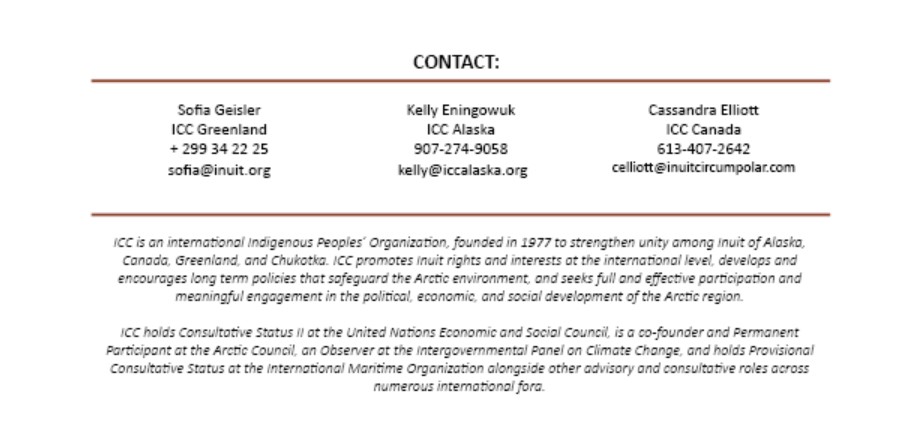12 May 2025 – Inuit Circumpolar Council (ICC) participated in the 14th Arctic Council Meeting held in Romsa-Tromsø, Norway. As a founding member and Permanent Participant representing approximately 180,000 Inuit across Alaska, Canada, Kalaallit Nunaat (Greenland), and Chukotka, ICC has played a central role in shaping the Arctic Council. Inuit have asserted their participation and meaningful engagement in the decision-making of the pre-eminent body for Arctic cooperation since its establishment in 1996, paving the way for the unique, consensus-based forum the Arctic Council is today.
ICC applauds the leadership of the outgoing Norwegian Chairship, which paved the way for the Council’s resumption of work during an unprecedented period of political difficulties. Looking ahead, ICC warmly welcomes the incoming Chairship of the Kingdom of Denmark for the 2025-27 term. ICC commends the Kingdom of Denmark’s Chairship Program, which places Indigenous Peoples’ leadership at the center of Arctic governance.
In a statement delivered by ICC Chair Sara Olsvig at the 14th Arctic Council meeting, ICC reaffirmed that Arctic cooperation must prioritize Indigenous Peoples’ rights and knowledge. “Nothing about us without us,” Olsvig emphasized, underscoring the long-standing demand for full and effective participation and meaningful engagement of Indigenous Peoples in all policymaking. “Recognizing our rights also means seeking a common understanding of the past, the challenges of the present, and the way ahead. We have an inherent right of self-determination, and the fulfillment of our rights at all levels of governance is imperative”.
“Working together cooperatively in a forum like the Arctic Council is not new to us – Inuit have mastered this as we are guided by our cultural values of respect, communication, cooperation and care. From the very beginning, Inuit have worked diligently, diplomatically, and practically to help shape the Arctic Council as the leading forum for circumpolar Arctic cooperation” says Marie Greene, ICC Vice-Chair (Alaska).
The incoming Chairship will be led by Naalakkersuisut, the Government of Kalaallit Nunaat (Greenland), and ICC celebrates the Kingdom’s appointment of its first Inuk Arctic Ambassador – a development Olsvig described as “historic, meaningful and in line with Inuit leadership over the past decades.” She stated: “Yes, our expectations are high, and we would not have expected anything less from the Kingdom. We are ready to continue contributing to the work and call on all Arctic States, Permanent Participants, and Observers to support the new Chairship — for the benefit of all.”
“As the Kingdom of Denmark assumes the Chairship – led by Naalakkersuisut, the Government of Kalaallit Nunaat (Greenland) – a unique opportunity emerges to set a new standard for Indigenous leadership at the heart of Arctic governance. These times call for upholding the rights of Indigenous Peoples and advancing solutions grounded in Indigenous Knowledge – priorities that are meaningfully reflected in the Kingdom of Denmark’s Chairship Program. ICC is proud to have contributed to the development of the program and welcomes its vision for the 2025-27 Chairship term”,says Hjalmar Dahl, ICC Vice-Chair (Kalaallit Nunaat – Greenland).
In 2024, ICC released a Position Paper reaffirming the Arctic Council’s vital role in the region and for Inuit. It called for stronger governance, urging member states to support and be accountable to Indigenous Peoples’ Organizations as Permanent Participants. ICC emphasizes the full recognition of Indigenous Knowledge into all Arctic Council bodies, replacing tokenism with meaningful participation and engagement, and calls for space, capacity, and funding for Inuit-led research to ensure Indigenous Knowledge remains central to the Council’s work.
“The Arctic Council was born from a vision of peace, partnership, and respect for the rights of Arctic Indigenous Peoples – principles that must not only endure, but be fortified. As co-founders, Inuit are founding architects of it. The Council’s future must address the accelerating impacts of climate change, uphold human rights, and center Indigenous knowledge in shaping responsible Arctic governance”,says Natan Obed, ICC Vice-Chair (Canada).
“Our knowledge systems of environmental management in the Arctic have been formed over thousands of years – it is important for us to preserve our traditions for the future. ICC remains committed to actively contributing to the Arctic Council’s work at all levels. The path forward must center the wellbeing of Arctic Peoples and safeguard the ecosystems that are intricately intertwined with our economies, cultures, and way of life”says Valentina Leonova, ICC Vice-Chair (Chukotka).
The 14th Arctic Council Meeting concluded with the adoption of the joint Romssa–Tromsø Statement which ICC took part in negotiating.
“Human lives across our region are deeply affected by how we choose to conduct our work in the Arctic Council. The spiritual and physical well-being of Arctic Indigenous Peoples is intertwined with the health of the environment around us. Further progress must be made — we can have no stagnation” Chair Sara Olsvig concluded in Romsa-Tromsø as ICC expressed full support for the joint statement.
14th Meeting of the Arctic Council in Tromsø, Norway, May 12th, 2025
Inuit Circumpolar Council Position – Safeguarding and Strengthening the Arctic Council
